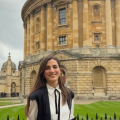
COVID-19 tips for your first term from an Oxford medical student
Joe Wilson is a final-year medical student and has been working with the University's Early Alert Service team throughout the pandemic.
Here he outlines what precautions you should take as an individual to keep yourself and everyone around you safe - focusing on COVID testing and self- isolation.
Go to the student page of the University coronavirus site for wider advice for students about COVID-19.
Dear Fellow Student,
Welcome to Oxford and the University and I hope you settle in well!
Although the world around us is beginning to look and feel a lot less abnormal than it was, there are still precautions that we must take to ensure we all avoid COVID-19 within our college, department and wider University communities. Here I outline what precautions you should take as an individual, and I will answer some of the questions you are likely to have.
What do I do if I think I have COVID?
The Early Alert Service (EAS) is an internal University COVID-19 testing service that allows you to book a PCR swab test if you believe that you may have COVID-19.
Symptoms include:
- A new cough
- A high temperature (if you are able to measure your temperature with a thermometer, a high temperature would be above 37.8˚C)
- Changes to your taste and/or smell
- A sore throat
- A runny nose
- Fatigue and/or muscle aches
If you develop any of these symptoms, we recommend that you book in for a PCR test via the EAS website. Many of these symptoms often occur as a result of other infections, but it is important that we rule out COVID-19 so as to protect yourself and others around you. If you’re worried – get tested!
Although we recommend that you book a PCR test through the EAS, you can also book one via NHS Test and Trace. If you get tested outside of the EAS then you need to remember to record the result to the EAS system.
What do I need to do if I book a PCR test through the EAS?
When booking a PCR test at one of our “pods”, it is done under the assumption that you think there is a chance you might have COVID-19. Therefore, once you book your test, we ask that you self-isolate until you receive the result. Again, this is just to be on the safe side. We aim to get the result back to you within 24 hours, but we are usually able to get your results back even sooner!
It is likely that you will have been in close contact with people in the 48 hours preceding your symptoms and providing the swab for your PCR test. We urge you to inform these contacts that you are being tested, and recommend that they be particularly vigilant in case they develop any symptoms. If any of your close contacts have not yet had two vaccinations in the UK through the NHS, we advise that they also self-isolate until you get your swab result.
I’ve tested positive for COVID-19 on a PCR test. What happens now?
The good news is that there is a wealth of support within your college and/or department that will guide you through your self-isolation, and any questions you may have. You will be asked to self-isolate for 10 days from when you first had any symptoms.
You will receive a call from one of the University testing team, who will ask how you are doing, and also some additional questions. They may ask about your living arrangements, and what support you will need your vaccination status; your close contacts; and any teaching and/or extracurricular activities you attended in the 2-5 days before testing positive...
Importantly, you should know that there is no line of communication between the EAS and any University disciplinary officers. We ask that you be honest with us, so that we can implement appropriate measures to limit any further transmission of the virus.
I’m a close contact of someone that has tested positive for COVID-19. What do I need to do?
The key here is vigilance. Many of you at this point will have received two vaccinations, and therefore do not need to self-isolate. However, double vaccination does not necessarily prevent infection. You must therefore pay close attention to any possible COVID-19 symptoms you may develop. If you develop symptoms, book in for a PCR test.
We also advise that you have a PCR test within 5 days of you being informed of being a close contact of someone who has tested positive for COVID-19. This should be done even if you do not develop symptoms. In this specific case we are not asking you to self-isolate while awaiting the result unless you have symptoms.
How can I regularly test myself for COVID-19 if I do not have any symptoms?
We recommend that you test yourself twice weekly for COVID-19 using lateral flow devices (LFDs). These can be collected from your College, many University departments and some other designated sites. You can also order them (at no charge) through the Government website, and can even pick them up from pharmacies, such as Boots on Cornmarket Street.
There is a video on the University website that explains how best to self-swab and use an LFD. Different manufacturers’ kits have different instructions though so be sure to follow those carefully. As with PCR tests, please upload your LFD results to the EAS system, even if they are negative.
Remember that LFDs are for when you do not have symptoms. If you have symptoms… book a PCR!
I’ve tested positive for COVID-19 on an LFD. What happens now?
If you test positive for COVID-19 on an LFD, you must isolate as it is likely you have COVID-19. Upload your positive test to the EAS system, where you will then be invited to have a confirmatory PCR test at an EAS pod. Until your PCR result is back, you should continue to self-isolate.
I have not yet had two vaccinations. Why is it important that I get fully vaccinated?
All of the COVID-19 vaccines that are licensed in the UK have been shown to be extremely safe. They are highly effective in preventing you from becoming seriously sick as a consequence of COVID-19. Vaccines are also effective at reducing the chance of you becoming infected in the first place, but they do not guarantee it. They are also likely to reduce the chance of developing ‘Long Covid’.
Double vaccination in the UK through the NHS also affords you a lot of other advantages:
- You are exempt from isolating if you are a close contact of someone that tests positive, as long as you remain symptom-free.
- A lot of social events are now asking for attendees to have received two vaccinations
- International travel guidance is less restrictive for those who have received two vaccinations.
If you have not yet been fully vaccinated, you can book a slot at one of many vaccination sites through the Government website. Your College GP will also be able to provide vaccinations. You can find out about the pop-up vaccine clinics in Oxford this term on the University website.
I have more questions. Where can I find answers?
Go to the student pages of the University coronavirus website for a range of additional information.
In summary, there are four key actions that I would recommend to keep yourself and others safe this term:
- Remain vigilant of COVID-19 symptoms
- If you develop symptoms, book a PCR test
- Keep testing twice weekly with LFDs
- Get vaccinated!
I hope you have a good first term in Oxford, and that you are able to make the most of it in the safest ways possible.
Best wishes,
Joe Wilson
Final Year Medical Student
On behalf of the entire University testing team.
 Student story: Finding space for Kosovo at Oxford
Student story: Finding space for Kosovo at Oxford
 Oxford students shortlisted as McCall MacBain Scholarship finalists
Oxford students shortlisted as McCall MacBain Scholarship finalists
 Student story: My time at Oxford has been deeply transformative
Student story: My time at Oxford has been deeply transformative
 Welfare blog: Dealing with imposter syndrome
Welfare blog: Dealing with imposter syndrome
 Student story: Rowing sabbatical officer
Student story: Rowing sabbatical officer